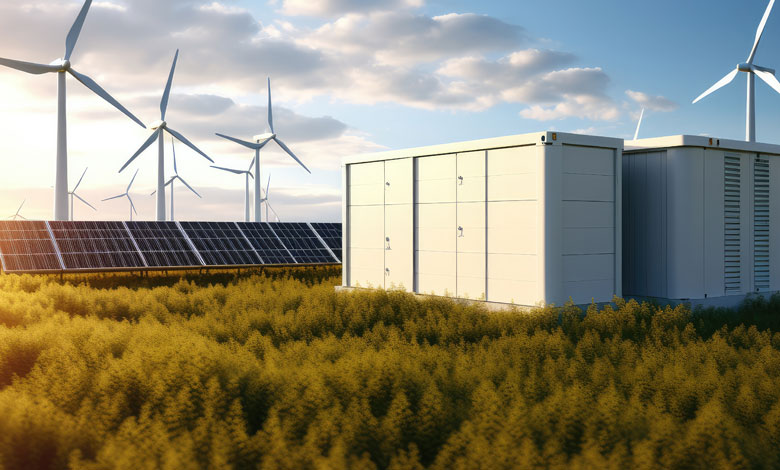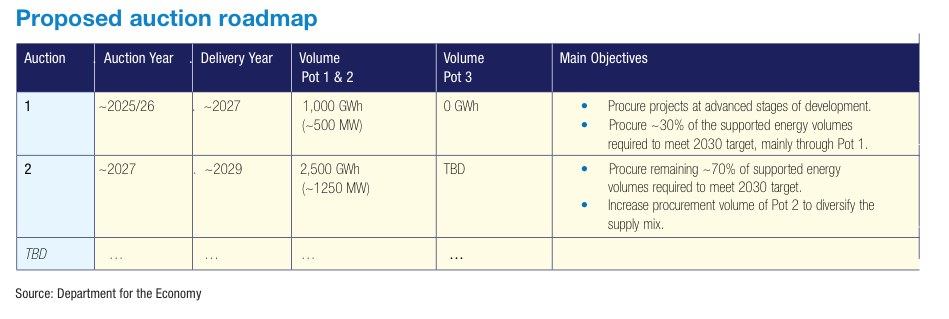2030 target to be met by two renewable electricity support auctions

An ambitious target of 80 per cent renewable electricity consumption by 2030 will need to be met by just two project auctions under the forthcoming renewable electricity support scheme (RESS).
Although not finalised, design considerations by the Department for the Economy for the RESS scheme suggest that only projects procured in the scheme’s first two auctions will be operational by 2030.
Currently, around 45 per cent of Northern Ireland’s electricity consumption comes from renewable sources, mostly onshore wind, and a significant gap exists in reaching the 80 per cent target mandated by the Climate Change Act in less than six years.
An estimated 3.5 TWh of generation are expected to require support if Northern Ireland is to meet the 80 per cent renewable electricity target and the Department’s proposed auction roadmap sees 1,000 GWh (~500MW), procured in 2025/26 for delivery in 2027. This means that auction one of the new support scheme is expected to deliver around 30 per cent of the supported energy volumes required to meet the 2030 target, with the vast majority being from onshore wind and solar projects.
Auction two, therefore, which is set to be held in 2027 for project delivery in 2029 will need to procure around 70 per cent of supported energy needed, a volume of some 2,500 GWh (~1250 (MW).
The Department says that this second auction will be used to increase the procurement volume of other technologies beyond onshore wind and solar, but it is not expected to support offshore wind projects.
Interestingly, no timeline has been offered for offshore wind support, despite recognition of the critical role it is intended to play in Northern Ireland’s transition to net zero. The Energy Strategy Action Plan 2022 commits the Department to a target of 1GW of offshore wind capacity from 2030 and the Department says that while it continues to “refine the timeline for offshore wind delivery, at this stage in development, it is not possible to confirm the scale and timing of offshore renewable generation deployment in Northern Ireland”.
The Department for the Economy first held a consultation on design considerations for a renewable electricity support scheme in February 2023 and in early April 2024, the Department issued its Proposed High Level Design on the RESS.
Calls for a renewable electricity support scheme had been longstanding with recognition that market conditions provided little incentive for developers to build further generation. The Northern Ireland Renewables Obligation (NIRO) was Northern Ireland’s last support scheme for encouraging increased renewable electricity generation in Northern Ireland and successfully catapulted the region to a world leader in renewable electricity.
However, the scheme closed in 2016/17, with the substantial delivery of new clean energy development in the region largely ending with it.
Outlining the primary aim of the scheme as “to encourage investment in local renewable electricity projects whilst also protecting consumers from global price shocks”, the Department stresses that the high level design paper is a “preliminary proposition only” and that the detailed design will be developed throughout the remainder of 2024.
The Department’s high level design paper was informed by analysis carried out by Aurora Energy Research on its behalf, which included a range of preliminary recommendations.
The design proposes a contract for difference (CfD) scheme, based on successful deployment internationally, for a variety of eligible technologies ranging from onshore wind and solar through to tidal energy and storage infrastructure.
Importantly, the scheme is likely to be voluntary, recognising that a mandatory migration to a CfD scheme for legacy projects would significantly alter the financial business model. Additionally, potential delays caused by legal objections to inclusion in a mandatory scheme should be avoided. Finally, feedback suggests that a mandatory scheme could pose a barrier to alternative routes to market, such as corporate power purchase agreements (CPPAs).
Subject to change is the proposal that the scheme proposes a minimum capacity for eligibility of 5MW, however, this is likely to be reduced following industry feedback. The Department notes no “broad consensus” for a dedicated support scheme for microgeneration, however, there is recognition that microgeneration could continue to make an important contribution to reaching targets, leaving open the possibility of delivery of a future scheme.
Also likely to be included in the final scheme is a community benefit fund, with the Department recognising widespread agreement that communities hosting renewable projects should benefit from the wider advantages gained by consumers in Northern Ireland.
The majority of feedback agrees that the optimal frequency for access to the scheme would be between one and two years, with a proposed contract length of 15 years. However, technology-specific contract lengths are an option. “A clear roadmap for upcoming auctions was also widely identified as critical to providing enough predictability for developers to manage risk,” the Department states.
On price, pay-as-clear stands out as the most suitable price clearing process, on the basis that auctions need sufficient competition for this approach to be effective. As expected, strike prices are likely to be indexed to inflation, minimising revenue uncertainty over the lifetime of the contract for generators.
Finally, there is wide agreement that planning permission and a grid connection offer should be required for projects to be eligible. It is also noted by respondents that these requirements are essential to protect customers from non-delivery or overly speculative bids. However, it has been warned that a balance must be found, and that additional requirements beyond planning permission and a grid connection offer may deter achievable projects, resulting in reduced competition in the auction process.
This eligibility poses a challenge. The Department estimates that the 30 per cent contribution from auction one will be from projects already in the planning pipeline. The planning system in its current format has been criticised as slow and cumbersome, particularly when it comes to major infrastructure projects.
With only projects procured in the first two auction round of a new renewable electricity support scheme likely to be operational by 2030, meeting the ambitious 80 per cent electricity consumption from renewable sources target by that timeframe will require a substantial shortening in determination times for planning applications.






